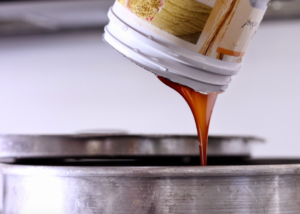-Kristin Weeks-

In an earlier post, we talked talked about what it takes to go from extract to all-grain brewing. At some point, whether it be after a few batches or perhaps a few years, most homebrewers will eventually take the leap and never look back. Over time, the seasoned homebrewer begins to speak a different language and develops a deeper understanding of how fermentation works. This creates an opportunity to experiment with different recipes and techniques, but does it necessarily mean making better beer?
The question of why extract brewing tends to get a bad rap is not new. A basic Google search on the topic will spit back links to countless articles and forums where homebrewers of varying levels defend both methods. You may find some refer to beer brewed from extract as “cheat beer,” whereas others will argue against its inferiority entirely. A few months back, I sat in on a local homebrew club meeting where AHA Director, Gary Glass, delivered an important message to members: Hey, don’t diss extract brewing!
For those not familiar with the difference between the two methods, extract brewing involves the use of pre-processed malt extract, which comes in either a syrup or dried powder, whereas with all-grain brewing, you extract your own sugars from the grain to produce the wort. This process, called mashing, typically takes several hours and requires the brewer to attend to temperature and efficiency calculations throughout. A good extraction is determined by other factors such as temperature, grind, even moon phases! On the other hand, someone doing an extract batch need not worry because the amount of sugar is predictable.
To go back to the question of whether beer brewed using the extract method can stand up to all-grain, the answer is YES. The bottom line is that you can make good beer starting with extract. Arguably, it’s not that step that even matters so much as compared to the conditions surrounding fermentation, when and what rate yeast was pitched, and water quality. Beyond that, here’s a list of 5 Reasons to Give Extract a Chance:
-
- Time– If you’re like many busy people, carving out 6-8 hours for brew day can be tough. One advantage to extract brewing is that the time is cut significantly. That’s because you get to bypass the mashing stage entirely. An extract batch can be made in just 3 hours.
- Small Batch Quality– Like my commercial brewer friend reminded me, smaller batches tend to offer more quality and personalization than volume. If you’re brewing a 5 gallon batch of beer or less, why not focus on the other parts of the brewing process such as pitching yeast, flavor additions, and adding hops that will ultimately make the beer… a beer!?
- Cheaper investment– Extract brewing does not require you to have a fancy all-grain brewing system. Yes, liquid malt extract may be slightly more expensive than grains, but you’ll save on equipment. As long as you have a large stock pot and a carboy or fermenting bucket to transfer into, you are set.
- Guaranteed Efficiency– As stated above, you don’t have to worry about efficiency with extract because the sugar content is already known (and as such your target gravity is easier to achieve). It’s just one more variable you can control.
- Accessible to New Brewers– As Gary Glass pointed out, 2 out of 5 craft brew drinkers are potential homebrewers. That’s 19 million people! Your friend is more likely to take up homebrewing as a hobby if you ease them in by starting with extract.
Extract brewing is a perfectly reasonable, effective, and consistent method of brewing beer and should not be frowned upon by experienced brewers. Here at Fifth Season, we strive to meet each individual where they are in their DIY journey. Whether you’re just starting to dabble in your new hobby or have years of experience, we are always eager to assist you.

Bryan says
As an all-grain brewer myself, I see nothing wrong with extract brewing. Like you mentioned, it can dramatically cut down the time it takes to brew a small batch and it makes things much more predictable.
Probably the largest benefit I’ve seen is the relief from messing with the mash process and trying to control that temp. Then there is sparging (unless you’re a BIAB brewer). Again, just more to worry about.
That said, I still tend to do extract batches from time to time when I know I want to make something quick, yet still have that homebrew feel to it.